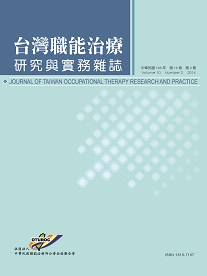Journal of Taiwan Occupational Therapy Research and Practice

半年刊,正常發行
背景:高齡者的睡眠可能因為憂鬱、健康行為差而影響睡眠品質。然而過去國內研究對憂鬱、各種健康行為與睡眠品質之相關性的探討仍然不多。目的:因此,本研究的目的在探討高齡者的憂鬱、健康行為與睡眠品質之相關性,希望透過本研究結果,提供改善高齡者睡眠品質之參考。方法:本研究採橫斷式研究法,主要對象為長照 C 據點之 60 歲以上高齡者,以結構性問卷收集個案資料。問卷主要有四個部分:人口學基本資料、簡式健康量表 (Brief Symptom Rating Scale, BSRS-5)、中文版健康促進的生活方式量表,包含六個面向 (Health Promoting Lifestyle Profile, HPLP) 與中文版匹茲堡睡眠品質指標量表(Pittsburgh Sleep Quality Index, PSQI)。主要統計方式:使用描述性統計來呈現人口學資料與各量表平均數與標準差。使用多元回歸分析檢驗睡眠品質與憂鬱、健康行為之相關性。以 PSQI 總分為依變項,分別以 BSRS-5 總分、HPLP 總分(與六個面向)為自變項,並同時校正人口學變項。結果:本研究共收集120位參與者,平均年齡為72.37 (± 9.32)歲。統計結果顯示高齡者之 BSRS-5、HPLP 總分與 PSQI 總分有顯著相關 (β = .58, -.40, p < .01),換言之,憂鬱程度越高,睡眠品質越差;健康行為表現越佳,則睡眠品質越好。此外,營養行為、社會支持行為、壓力處理行為面向與PSQI總分具顯著相關(β = -.23, -.19, -.18, p < .05 ~ .01),換言之,營養行為表現較好、有較多的社會支持、良好的壓力處理技巧,則睡眠品質越好。結論:由以上結果得知,可能可以透過降低高齡者之憂鬱程度、促進健康行為,來改善其睡眠品質。此外,建立高齡者重視營養攝取、良好的人際關係與學習壓力處理的技巧,或許能有效的提升睡眠品質。
Introduction: Depression or poor health-related behaviors could affect sleep quality in elderly. However, the relationships between depression, health-related behaviors and sleep quality are understudied. Therefore, the purpose of this study was to investigate the associations between depression, health-related behaviors, and sleep quality in community dwelling elderly. Method: Using a cross-sectional study, a self-administered questionnaire consisting of demographics, Brief Symptom Rating Scale (BSRS-5), Health Promoting Life Profile (HPLP), and Pittsburgh Sleep Quality Index (PSQI) was completed by older people aged over 60 from a community care centers in central Taiwan. Descriptive statistics were used to describe the demographic characteristics and mean scores of all measures. Multiple regression analyses were carried out to investigate the correlations between sleep quality, depression, and health-related behaviors. The PSQI score was treated as a dependent variable and the scores of BSRS-5 and HPLE were used as independent variables while adjusting for demographic variables. Results: A total of 120 community dwelling elderly (mean age = 72.37 ± 9.32) participated in the study. A significant association with the scores of BSRS-5, HELP, and PSQI was found (β = .58, -.40, p < .01). The results indicate that the higher levels of depression, the lower the sleep quality and the more engagement in health-related behaviors, the better the sleep quality. In addition, the subscale scores of nutrition, interpersonal support, and stress management of the HPLP were significantly correlated with PSQI score (β = -.23, -.19, -.18, p < .05~.01). The findings indicate that community dwelling elderly who were well-nourished with more social support and better coping skills in stress had better sleep quality. Conclusion: The sleep quality of community dwelling elderly could be improved via reducing depression levels and promoting health-related behaviors. In addition, it is important to simultaneously consider the factors of nutrition, social support, and stress management because they appeared to be significant factors to sleep quality.












